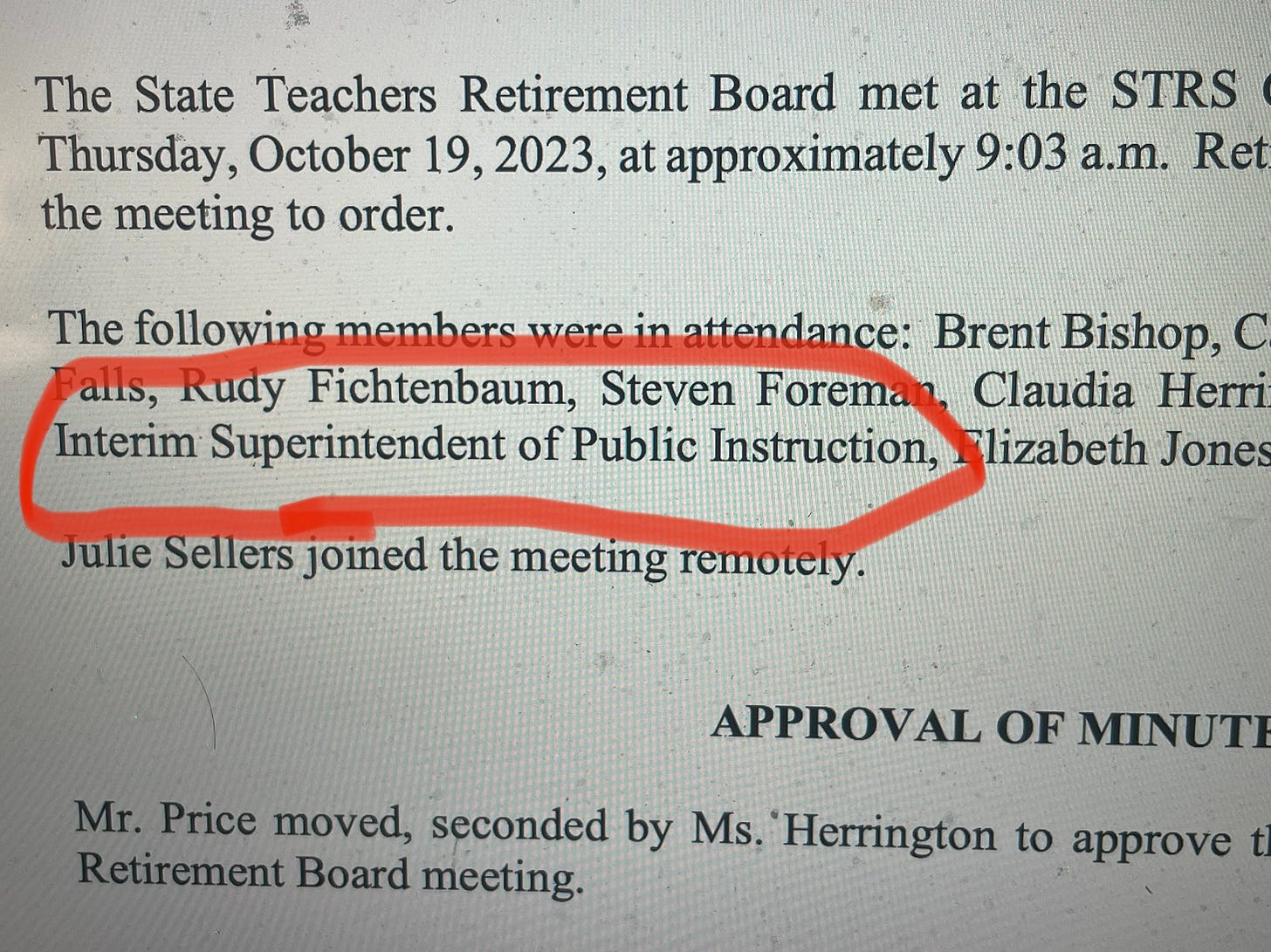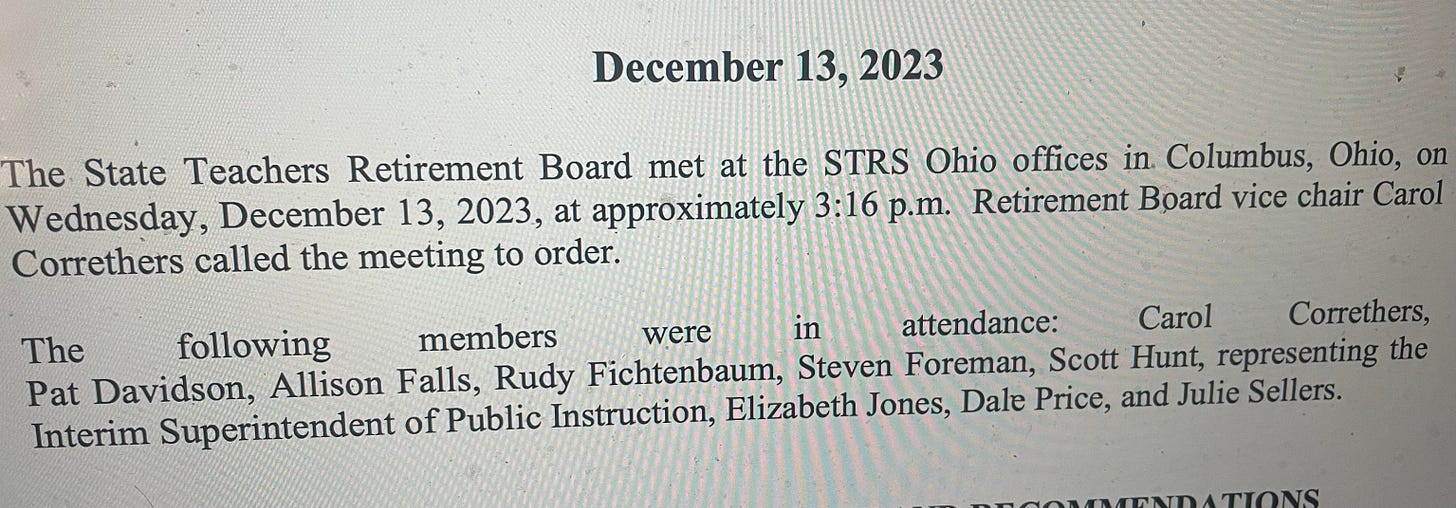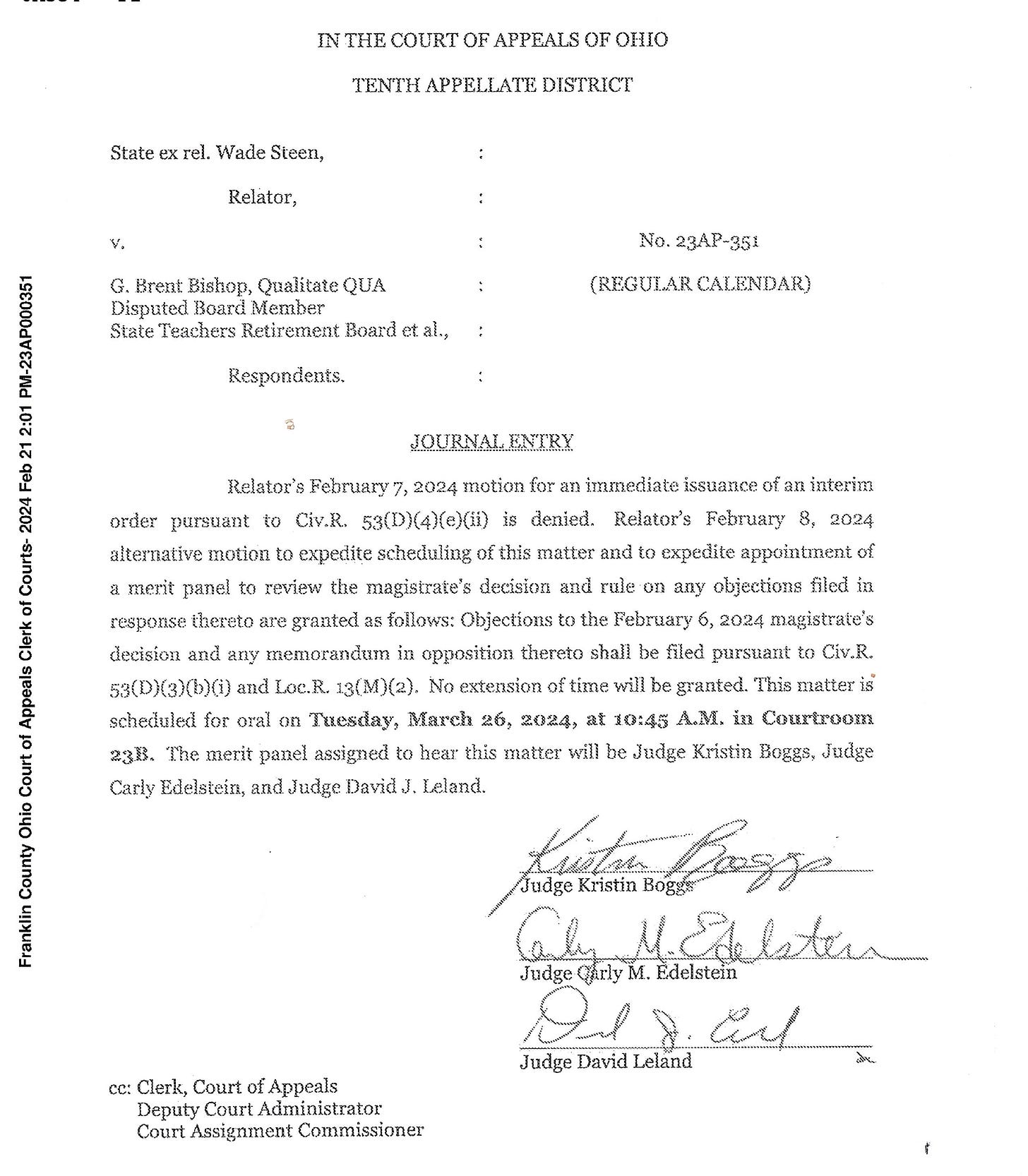Often, in broken states like Ohio, the movement of chess pieces that control both power and money is hidden behind the chaos of extremism that dominates statehouse politics on a daily basis.
As we watch and react to the high-profile stuff, those in power make maneuvers on the low-profile stuff that have a huge impact on money and power. And the more watchdogs and journalists and independent checks and balances go by the wayside, the more these maneuvers take place with no one knowing. Or….after it’s too late.
Want an example?
Here’s an instructive one, and it involves the Retired Teachers Pension Board I’ve been writing about.
Maybe others saw it, but I confess, I missed it. And although I’m an outsider to Columbus, I try to keep up as best as I can. (Always feel free to email me any stories you think I’m missing—this insight came from one such email).
Two Simultaneous Power Plays
This example brings together two of the biggest issues I’ve focused on recently.
First, I’ve pointed out how problematic the Governor’s brute-force takeover of Ohio’s independent Ohio School Board has been. That takeover gutted the institutional checks and balances that voters put in place 70 years ago to keep politicians (and their backers) from riding herd over state education policy. And it eliminated Ohio voters’ direct say on the direction of Ohio education.
The coup over major educational decisions was timed right after 2012 results that the state’s GOP didn’t like. And unless an Ohio court overturns it (litigation is pending), it’s basically succeeded for now—which should scare the hell out of all of us. Decisions over vouchers, curriculum, etc. are now being made behind closed doors by the very people who brought us the ECOT and FirstEnergy scandals.
At the same time, I’ve been equally alarmed by the fact that the Governor was so eager to terminate and replace a board member of the 11-member Retired Teachers Pension Board that he violated Ohio law (according to a recent magistrate’s decision) to do so—directly and personally intervening to nullify the outcome of a highly contested board election. That too is still in the courts.
Those of you who keep up with my newsletters are well versed on both these issues.
The Connection
Beyond the broader attack on public schools and teachers, there’s a direct and very precise connection between these two issues. Amid these simultaneous disputes, a major chess piece moved with hardly any discussion (although I have no doubt it was discussed with glee by the insiders). Here’s that move:
With more than $90B under their collective purview, impacting 100,000s of members, each of the Teachers Pension board’s 11 seats is incredibly important. Each individual seat is so important, apparently, that the Governor was willing to, according to that magistrate’s decision, break the law to ensure he exerted controlled over just a single seat.
But for years, the seat from which he removed that member is the only seat out of the 11 that the Governor directly appoints (to a four-year term). Amid the 11 total seats, the allocation has represented a careful balance of various and independent stakeholders. Here’s how it breaks down:
One Governor appointee
Five seats representing current/contributing teachers (determined via elections of those teachers) —in recent years, each of these seats has been hotly contested
Two seats representing retirees (also determined via elections) — again, each of these, hotly contested
One member appointed jointly by the speaker of the Ohio House and the Senate president, and
One member designated by the State Treasurer.
Count them up, and that’s 10 total.
The 11th member — well, that’s the interesting one I want to talk about now.
You see, if you look at recent minutes of the STRS Board meetings, you’ll see that the 11th board member has been someone named Scott Hunt.
The minutes make clear that Mr. Hunt has been sitting on the board as the designated representative of the Superintendent of Public Instruction. (Of late, due to a vacancy, he’s been the designee of the Interim Superintendent. But now we have a new Superintendent, whose name is Paul Craft.)
So the Superintendent of Public Instruction of Ohio (or her/his designee) has been that 11th member of the Pension Board.
And who chooses the Superintendent of Public Instruction of Ohio?
She or he is selected by the State School Board (again, that independent body made up of both elected and appointed members, the powers of which the Governor attacked in his state school board takeover). Given that the voters of Ohio gave this independent body a major role over education generally—and that Ohio voters vote for a majority of the State School Board members—having the Superintendent whom the Board selects sit on the Retired Teachers Board makes sense. And just like other checks and balances, that seat would’ve brought a unique and independent view to the pension board, apart from other board members, be they the governor’s or treasurer’s appointees or the elected members.
BUT…those minutes above were from a few months ago.
If you look at the current list of the 11 Retired Teachers Board members on the website, you won’t find the name Scott Hunt anywhere.
You’ll see all the members I listed above, but no Scott Hunt. (You won’t even see the name Paul Craft, or even the title Superintendent of Public Instruction mentioned in the minutes above.)
Who do you see instead as the 11th board member?
This guy (this photo is from the website):
Who is this?
His name is Steve Dackin, and as the graphic says, he’s the newly appointed Director of the Department of Education and Workforce. As the controversial school board takeover law commanded, Dackin was appointed to that director role by the Governor (not the state school board) late last year. (And the Governor selected him despite the fact that he had previously resigned from being Superintendent for having violated ethics rules.)
So why is he suddenly on the Retired Teacher Pension Board?
Because one of the powers the Governor and legislature stripped from the State School Board and Superintendent of Public Instruction was that they eliminated the Superintendent’s Pension Board seat.
And who gets to occupy that 11th seat instead? The newly created Director of the Department of Education and Workforce.
Now, you’d be forgiven for not noticing this. This change is not mentioned in the summary of the change that took place on the Department of Education's website. It didn’t get mentioned in stories covering the takeover of the state school board, even as the spirited pension board fight was playing out over just one seat at the same time.
But if you look at the Ohio statutory provision outlining the Retirement Board makeup, you’ll see the change is written clearly (ORC 3307.05)—right up top. And it’s effective October 3, 2023 (when they passed and Governor signed the takeover bill).
And finally—who makes the appointment of the new position of the Director of Education and Workforce, and as a result, the appointment of that newly configured Retired Teachers Pension Board seat?
Answer: the Governor, approved by the State Senate.
So amid the carefully balanced pension board—where the Governor and legislature each had a single seat, and the School Board/Superintendent had a separate and independent seat—the Governor basically grabbed himself a second seat.
That’s right, through the State School Board takeover, he also doubled his power on the Retired Teachers Pension board.
And when seats are so valuable that each election for one is heavily contested—so crucial that a magistrate ruled that the Governor broke the law to control what happens in one seat—that shift from an independent body being represented on the board to a second Governor’s seat is a BIG switch.
Another coup of control.
One that has, from what I can gather, hardly been noticed even as the makeup of the board has been such a source of controversy for the past year.
Ironic, isn’t it—DeWine may have broken the law to assert control over one seat, but while we’ve been watching that battle, he and the legislature managed to change Ohio law to get himself a second appointment, and to double his potential influence on the board.
After the Switch…
What’s interesting is that apparently this switch was done with such stealth, and such speed, that even though Ohio law says that the director of the department of education and workforce or her or his designee is the current board member, and even though Dackin is listed as the board member since (according to the website) being “appointed to office in 2023,” (his appointment was finalized on December 6), Scott Hunt STILL took part in the December 13 meeting.
And he did so not as the designee of Mr. Dackin—who the website tells us is the board member and has been since he was appointed in 2023. But Hunt is listed still as representing the Interim Superintendent of Public Instruction (who no longer was a member nor can appoint a designee under Ohio law).
Maybe it was simply a mistyping of the minutes, and maybe Scott Hunt will continue to serve as a designee of Mr. Dackin instead of the Superintendent of Instruction, but either way, let’s get it straight, fellas. This is a $90 billion pension fund, after all.
If you’re going to move major chess pieces of power around when few people are looking, you need to at least alert those implementing your maneuver about what you’ve done.
In the meantime, an order was issued yesterday expediting the 10th district’s consideration of DeWine’s actions removing the other board member. Oral arguments will now take place in March:
I’ll keep you posted.











David, many thanks for your talk yesterday at the League in OC. I have shared your school voucher explanation with about 20 people so far, and everyone was unaware except my sister, who's a teacher in IL. I also spoke with a neighbor, when walking dogs, about the Board of Education election. He got the point, and was concerned. Then he said, "I'm actually politically agnostic." My response, "It's not about partisanship, it's about being pro-Democracy." He nodded and said, hadn't thought about it that way. THANK YOU for talking about in a different way.
DeWine's takeover of Ohio Education!! There is obviously $$$$$$$$$$$ involved for him!